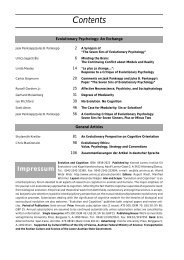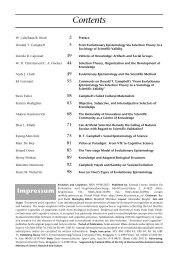Contents - Konrad Lorenz Institute
Contents - Konrad Lorenz Institute
Contents - Konrad Lorenz Institute
You also want an ePaper? Increase the reach of your titles
YUMPU automatically turns print PDFs into web optimized ePapers that Google loves.
Fredric J. Heeren<br />
Was the First Craniate 1<br />
on the Road to Cognition<br />
A Modern Craniate’s Perspective<br />
O<br />
ne might propose<br />
three mutually exclusive<br />
hypotheses to explain<br />
the existence of human-level<br />
cognition 2<br />
observed on Earth:<br />
1. Human-level cognition<br />
occurs as a fluke in<br />
the universe; on Earth it<br />
may be explained as an<br />
incidental result of highly<br />
contingent events. 3<br />
2. Human-level cognition<br />
is a common occurrence<br />
throughout the universe;<br />
its existence on<br />
Earth may be explained<br />
as a result of highly constrained<br />
or law-like processes.<br />
3. Human-level cognition<br />
on Earth can be explained<br />
as neither fluke<br />
nor the result of law-like<br />
processes; 4 the frequency<br />
of its occurrence in the<br />
universe may not be predictable.<br />
An investigator who<br />
knew that hypothesis 1 or 2 was correct would be<br />
able to comment knowledgeably upon the probability<br />
of human-level cognition existing on any planet<br />
where signs of life were observed. To estimate the<br />
probability of human-level cognition on such a<br />
planet, a scientist might only need to know the<br />
length of time that the planet had sustained conditions<br />
for life. Ideally, an investigator attempting to<br />
choose between the above hypotheses should observe<br />
life at several stages on many habitable planets<br />
Abstract<br />
Chinese fossil discoveries of the earliest known craniates<br />
(from the early Cambrian period) have led scientists<br />
to question whether the evolution of human-level<br />
cognition is a rare occurrence in the universe. The earliest<br />
chordate is now best represented by a well-documented<br />
metazoan called Haikouella lanceolata.<br />
Possessing a relatively large brain, this animal appears<br />
to demonstrate that the brain and endoskeleton<br />
did not evolve together, as had been assumed, but<br />
rather that the brain appeared long before full endoskeletization.<br />
The paleontologist who describes the animal<br />
further notes a “top-down” pattern in the<br />
appearances of new forms in the fossil record. Researchers<br />
find such observations relevant to the question:<br />
Was the evolution of human-level cognition in<br />
some sense inevitable, or was it an accident dependent<br />
upon historical contingencies The new evidence<br />
for early craniates lends support to the view that human-level<br />
cognition may be part of a developmental<br />
package, but historical contingencies pose serious<br />
problems for a strictly law-like explanation.<br />
Key words<br />
Contingency, convergence, developmentalism, directionality,<br />
internalism, saltation, top-down evolution.<br />
before claiming confidence<br />
in his selection. Of<br />
course, the best an Earthbound<br />
scientist can do at<br />
present is to search for<br />
helpful clues on the one<br />
planet where we know<br />
that life exists; and here<br />
at least Earth’s crust does<br />
provide helpful access to<br />
pertinent glimpses of past<br />
life stages. Of greatest relevance<br />
for any such researcher<br />
is the fossil<br />
record’s snapshot in<br />
which the body plan 5 first<br />
appears that would eventually<br />
house human-level<br />
cognition.<br />
To join such an investigation,<br />
we would like to<br />
explore the following<br />
questions: When does<br />
this body plan appear relative<br />
to other body plans<br />
Does this body plan have<br />
an assured, or at least a<br />
likely, survival to permit<br />
time for the evolution of<br />
cognition—or is the survival of its future lineage dependent<br />
upon highly contingent events Do other<br />
body plans appear that would also seem to make<br />
good candidates for the support of human-level<br />
cognition How predictable is the appearance of a<br />
suitable, large brain-carrying body plan For that<br />
matter, upon what basis can we predict body plans<br />
at all, or changes in any form of life Does evolution<br />
proceed in a bottom-up fashion where small<br />
changes accrue into large ones aided by no higher<br />
Evolution and Cognition ❘ 141 ❘ 2003, Vol. 9, No. 2








